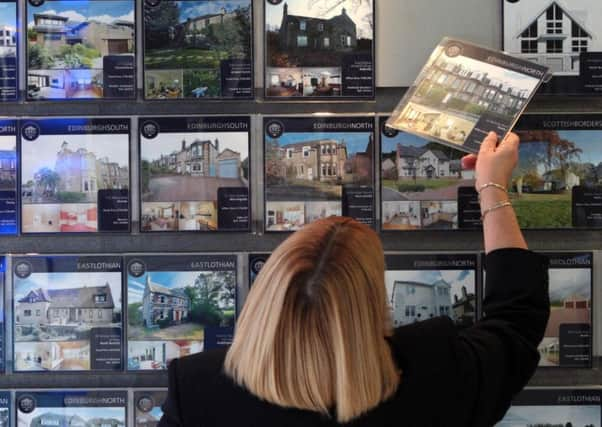Generation rent: How Scots are struggling to afford mortgages


STEPHEN had all but given up on his plan to buy a flat in Edinburgh until a friend made him aware of the government’s Help to Buy scheme.
Like many people in their late 20s, he was keen to buy a place of his own after renting for more than a decade.
Advertisement
Hide AdAdvertisement
Hide AdBut his job in HR at a bank in the capital’s George Street did not pay enough to make the possibility of obtaining a mortgage seem likely.
“Not every bank helps first time buyers like me, and those that do require a deposit of at least 10 per cent. In Edinburgh, that realistically means you’re looking for at least £12,000,” he said.
“Given my outgoings on things like rent, that just wasn’t going to happen for a long time. I was beginning to accept the fact I would have to look elsewhere, most likely in Fife.”
Stephen, who was single at time, was already saving money by choosing not to own a car as well as making other efficiencies.
Under the Help to Buy scheme, he was able to buy a new build, two-bedroom flat in north Edinburgh. As the government has a 25 per cent stake, he was required to find a deposit of five per cent – around £5,000. Under the terms of the deal, he has 20 years to buy out the government’s stake, or they will take a quarter of any profit when the property is sold as well as the original stake.
Help to Buy closed to new applicants in May this year. The scheme across the UK has part-funded more than 113,000 mortgages – 80 per cent of which have been first-time buyers.
A successor scheme to Help to Buy was announced in September, and will focus on affordable homes, with eligible buyers receiving an equity loan towards the purchase price of a new-build home.
It’s likely to prove every bit as popular.
Half of those who rent privately will spend more than half of their monthly wage on accommodation compared to one-fifth of mortgage holders, according to the latest housing report from Savills research.
Advertisement
Hide AdAdvertisement
Hide AdAs the numbers of people renting across the UK has rocketed, and as property prices continue to grow, the minimum deposit required for a mortgage is steadily increasing.
Home values across Edinburgh are growing faster than anywhere in the UK outside of London. The cost of the average home in the capital is now £270,000.
Savills predicts the average house price across Scotland will reach £160,339 by 2020 – a 14.2 per cent increase on current levels.
Neal Hudson, of Savills research, said: “The unaffordability of buying due to deposit constraints means that there is massive competition for homes in the private rented sector.
“This unaffordability combined with a relative lack of new homes being built suggests this demand for homes in the private rented sector will continue to grow despite the best efforts of government to encourage home ownership.
“This will put further pressure on rental affordability and lead to more overcrowding in the sector.”
In 2006, there 403,800 first time buyer mortgage approvals. By 2014, that number had dropped to 311,700.
One in five people aged 20 to 45 who haven’t yet bought their own home believe it’s “virtually impossible” for first-time buyers to secure a mortgage, according to the recent Generation Rent report from Halifax.
Advertisement
Hide AdAdvertisement
Hide AdA quarter of young people in Scotland aged 20 to 34 live with their parents, blaming rising rental costs, low wages and the difficulties faced in obtaining a mortgage as reasons.
Robert Black, chairman of an independent commission established by housing charity Shelter, said there was a “homes crisis” in Scotland.
Speaking to promote a new report on housing north of the border, published in June, he said the number of new homes built each year needed to rise to at least 23,000. The number built in 2013-14 was around 15,500.
The report also revealed that 150,000 households were currently on waiting lists for social housing.
A Scottish Government spokeswoman said: “We are investing £1.7 billion in affordable housing and are 90 per cent of our way to reaching our five year target of delivering 30,000 homes by 2016.
“Within that we support people into affordable home ownership through the Open Market Shared Equity scheme which was increased to £80 million earlier this month. Since 2011 over £100m has been invested in our shared equity schemes for first-time buyers helping almost 10,000 people to buy a home. We have also provided over £300m support through our Help to Buy (Scotland) and Small Developers schemes which has assisted over 7,000 new build homes to be purchased to date since the scheme launched in September 2013.
“In addition, the recently announced £195 million successor scheme to Help to Buy will assist, over the lifetime of Help to Buy and its successor, around 14,000 households into home ownership.
“Our residential Land and Buildings Transaction Tax rates and bands prioritise support for first-time buyers and mean that no tax will be payable on half of all house purchases in Scotland, with more than 40,000 home buyers paying less tax than they would under UK Stamp Duty Land Tax.”